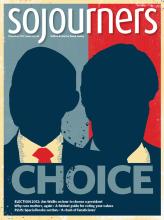ON A WARM evening this June, a group of faith-based activists stood outside Realco Guns Inc. in the Washington, D.C. suburb of District Heights, Md., with signs asking drivers to honk in favor of ending gun violence. Almost every driver passing through rush-hour traffic obliged. Supporters, many waving and cheering from open windows, varied in age, race, and car model. Protesters estimated they heard 350 honks that day, more than twice that of their first protest exactly a year before.
“One out of every eight guns that Realco has sold has ended up in crime,” protest organizer Rev. James E. Atwood told Sojourners. He and his team are part of Heeding God’s Call, an ecumenical movement raising awareness about gun violence in the United States.
Atwood was citing a 2010 investigative report by The Washington Post. The report, which drew on state databases and local police evidence logs, showed that during the 18 years prior, police recovered more than 2,500 Realco guns, including weapons linked to 86 deaths and 300 non-fatal shootings, assaults, and robberies in the Washington, D.C. area. Many of the guns involved were purchased by so-called “straw buyers” and then passed to third parties—often people who, due to criminal records or history of mental illness, were barred by law from buying firearms.
One reason the Post report is valuable is that, since 2003, the federal Bureau of Alcohol, Tobacco, Firearms, and Explosives (ATF) has been prohibited by Congress from sharing similar information from its firearms trace database (except with authorities working on specific crime cases). Before the data blackout, a 2000 report indicated that a handful of U.S. gun retailers—1.2 percent of around 83,000 registered businesses—had ties to nearly 60 percent of the crime guns police traced to an active dealer.
Read the Full Article
